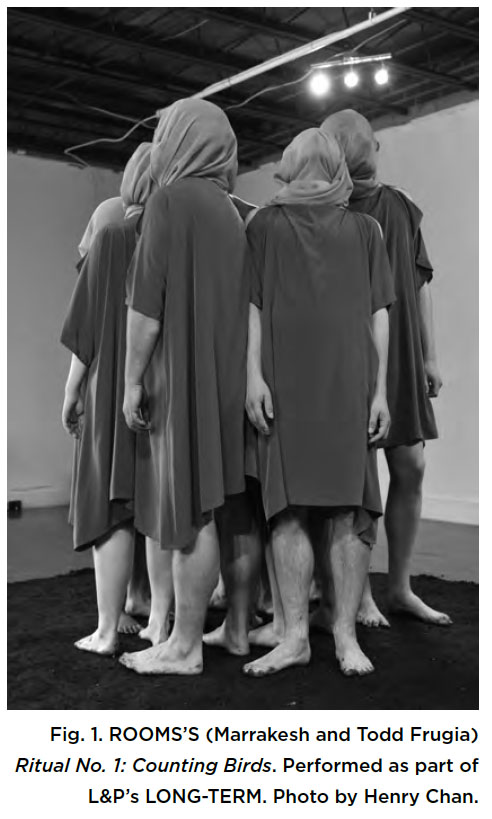Forum: Link & Pin
FORUM:
LINK & PIN Performance Art Series
ADRIANA DISMAN, Guest Editor, L&P Organizer and Curator
1 LINK & PIN started in my grandmother’s house. During spring-summer 2011, I invited artists to perform in the main floor of her home in the heart of downtown Toronto. What began as space-making for performers whose work I wanted to see, a way for peers to share their process and build community, quickly outgrew my grandmother’s living room.
2 For their 2013-14 season, hub14—a co-op studio that houses mainly dance in downtown Toronto—awarded me their Community Chest programming to bring performance art into the space. Veronica Abrenica came on board as the L&P intern to help make these events happen and the excellent Toronto performance art photog- rapher Henry Chan agreed to document. L&P was born.
 Display large image of Figure 1
Display large image of Figure 13 L&P’s programming at hub14, called theSunday Series, consisted of four events held from October 2013 through April 2014. Decidedly performance art focused, L&P strives to continuously change the models and structures through which it runs. Each event was curated through a different mech- anism (call for proposals, crowd-sourced programming, invitational, and co-curated) in hopes of short circuiting the insularity that curation so often results in. Artists were offered a theme to relate/respond to for each event. I also invited writers to generate texts on each event and tried to invite a range of voices (artists who write, PhD candidates, estab- lished professors, those from art historical, dance, and performance studies backgrounds). These events also turned on my interest in questioning ways of cultivating connections between audience members via small techniques such as food-sharing, walking, and opening spaces for horizontal conversation. Held mostly on Sunday afternoons, I hoped that daytime performance events might allow for a different kind of energy and attention with which to share and receive the work than the usual evening presentations. The series also included two performance art workshops led, separately, by Victoria Stanton and myself. As a zero- budget event, I was constantly thinking about and questioning what it meant to ask artists to perform for free, and to work for free myself—questions of labour were often the topic of conversation.
4 As I write, L&P is gearing up for its move to Montreal’s anti-racist, queer feminist gallery, RATS9 Artist-run Centre. This Forum section offered by TRIC/RTAC is a wonderful chance to reflect on where we’ve come from and where we’re heading as communities, creators, and thinkers of performance art in Canada. In the following, four sections provide an overview of each of the four events with articles by L&P authors: Kelsy Vivash examines Thea Fitz- James’s piece in relation to the feminism of bodily (de)containment; Niomi Anna Cherney unpacks the phenomenology of participation through vulnerable bodies; T. Nikki Cesare Schotzko articulates performance art 2.0’s concern with the “authentic” and the temporal confounding of the (re) in (re)performance; and I explore the (messy) hermeneutics of self- violent performance art.
5 For more specific descriptions of each performance, images, and bios of all the artists featured, see our archival site cargocollective.com/LINKPIN. You can find our current programming at linkandpinperformance.wordpress.com.1
6 More more info, please contact: linkandpinperformance [at] gmail [dot] com